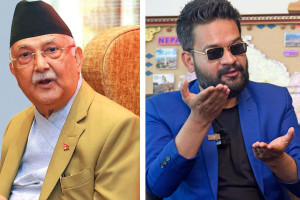Columns
Long-delayed civil service bill
Subnational governments’ inability to manage their staff continues to restrict their effectiveness.
Khim Lal Devkota
The federal parliament of Nepal is finally taking essential steps towards the passage of the Federal Civil Service Bill. This is arguably one of the most significant pieces of legislation needed to institutionalise federalism in the country. Although the bill is essential for enabling provincial and local governments to recruit, deploy and manage civil servants independently, its progress has been repeatedly stalled due to political disputes and resistance from various influential groups, including civil service trade unions and major political parties.
Despite these hurdles, the State Affairs and Good Governance Committee of the House of Representatives took considerable time and effort to address bureaucratic overreach and build cross-party consensus. One key provision was introducing a mandatory two-year “cooling-off period” for retiring civil servants, barring them from immediately taking up appointed government positions. This was intended to promote integrity and reduce conflicts of interest in public service.
However, in a deeply concerning turn of events, the provision was removed from the version of the bill that was eventually passed—without the knowledge or consent of the committee that had approved it unanimously. This unauthorised change has sparked outrage, leading to the formation of a special parliamentary investigation committee to determine how and why the bill was altered. No one has taken responsibility for the modification, which raises serious questions about transparency and accountability in the legislative process.
The debate over the cooling-off period reveals fundamental weaknesses in how laws are made in Nepal. It illustrates the continued dominance of the executive branch over the legislature, undermining Parliament’s constitutional role as the sovereign lawmaking body. It also exposes how vested interest groups, particularly organised bureaucracies, exert disproportionate influence over legislation. Furthermore, it reflects a troubling lack of oversight and due diligence in vetting legislative content before it is finalised.
In response to the tampering, the State Affairs and Good Governance Committee has formally requested that the National Assembly restore the original cooling-off provision, as unanimously agreed. Yet this provision is only one of many concerning aspects of the bill. Perhaps most surprising is the CPN-UML’s contradictory stance. The party supported the two-year cooling-off clause in the House of Representatives, but its lawmakers have now proposed removing it entirely in the National Assembly. When asked why, several lawmakers admitted they had received “instructions from above.”
Despite this reversal, the likelihood of the amendment being passed is low. In the 15-member Legislation Management Committee of the National Assembly, the UML holds only three seats. The Nepali Congress remains firmly in favour of retaining the provision, and even a UML-Congress alliance would not command a majority. Opposition parties such as the Maoist Centre, which support the provision, hold a majority and are expected to block any attempt to weaken it.
The inability to pass a Federal Civil Service law nearly a decade after the Constitution was adopted is deeply troubling. The ongoing controversy surrounding the cooling-off period reinforces the fear that bureaucratic interests and pressure groups are obstructing crucial reforms.
The broader debate around the Civil Service Bill has primarily focused on protecting the interests of federal civil servants. Discussions have centred on preserving central control over recruitment, staff mobility, service classification and trade union rights—while neglecting essential federal principles such as intergovernmental coordination, accountability, service delivery and empowerment of subnational governments. Even more concerning is that the bill was drafted and debated without meaningful input from provincial and local governments—the very institutions responsible for its implementation.
This limited discourse, both in Parliament and the media, reflects how civil service reform has become a captive of organised interest groups. It reveals a lack of genuine commitment to the federal vision outlined in the Constitution, which is built on the four pillars of federalism, republicanism, inclusion and secularism.
Another problematic provision in the bill is the federal government’s proposal to continue deputing chief administrative officers and provincial secretaries to provincial and local governments for the next 10 years. This arrangement is based on two flawed assumptions: First, that subnational governments cannot govern themselves; and second, that concurrent powers assigned to all levels of government automatically fall under federal jurisdiction. Both assumptions are either factually incorrect or are being used strategically to maintain federal dominance over subnational institutions.
The claim that local and provincial governments lack capacity is particularly problematic. In many cases, the same civil servants who were deemed competent while serving at the federal level are suddenly labelled as unfit when transferred to provincial or local posts. Even if capacity challenges do exist, they are largely a result of structural imbalances created during the civil service adjustment process, which concentrated most staff at the federal level. More importantly, the inability of subnational governments to hire and manage their staff continues to restrict their development and effectiveness.
During the adjustment process, many civil servants refused placements in provincial or local offices. Ironically, those same individuals now argue that deployment should remain under federal control for another decade. This position directly contradicts the spirit of the constitution and the Employee Adjustment Act of 2017 (2074 BS), which clearly states that the respective governments should address staffing needs at the provincial and local levels. Article 227 of the constitution further affirms that the management of municipal employees and offices must be governed by provincial legislation.
It is useful to remember that after the 1951 (2007 BS) revolution, Nepal’s ministries operated out of ministers’ private homes—and yet the country continued to function. Capacity has always been a challenge, but it evolves. The real issue is trust. Empowering subnational levels by genuinely devolving authority is a far more effective way to build their capacity than continuing centralised control from the federal level.
Given that members of the National Assembly are elected from provincial and local levels, they must correct the problematic aspects of the bill, reinstate the cooling-off period and ensure that the legislation reflects the true spirit of federalism. In the past, political parties have often bowed to pressure from influential stakeholders and lobbyists. But this time, the controversy over the cooling-off clause—and the lack of accountability for its removal—should serve as an opportunity to reassert Parliament’s authority and restore public faith in the legislative process.
This moment must be a turning point towards a more inclusive, transparent and accountable approach to lawmaking. The CPN-UML’s contradictory stance on the cooling-off provision—supporting it in one chamber while opposing it in another—is a clear example of political double standards. According to Ramhari Khatiwoda, Chairperson of the State Affairs and Good Governance Committee, the Nepali Congress remains committed to passing the provision, even if it means collaborating with opposition parties like the Maoist Centre.
At a time when public dissatisfaction with the federal republican system is rising, it is the responsibility of those who have gained the most from this structure—elected officials, political leaders and bureaucratic institutions—to defend and deliver on its promises. They owe this not just to their parties or administrative peers, but to the citizens of Nepal. Only by doing so can we safeguard the achievements of the federal republic and prevent a dangerous slide back into the centralised monarchy that failed Nepal for generations.




 10.12°C Kathmandu
10.12°C Kathmandu















